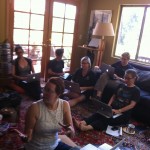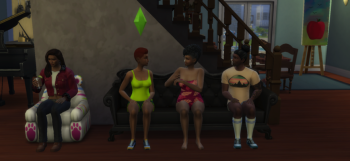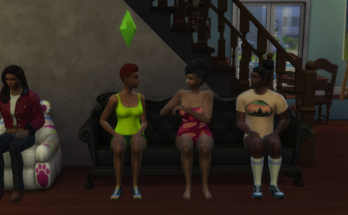In Spring 2019, I re-booted my course, Feminist Online Spaces (and hence this site that holds it among other things). This time I taught it with Masters students in Liberal Studies (MALS) at the CUNY Graduate Center and it was called Contemporary Feminist Theories: The Nowheres & Everywhere of Online Feminism. Some quick research established that the last time I had used this site was six years previously in August 2013. At that time it was serving as a research and teaching site for me as well as the temporary internet home for the then still-forming FemTechnet. The last post from that use was called “Ramping Up: Dialogues on Feminism and Technology.” It held some of our collective work as a small number of us began to nourish the roots of what would become FemTechNet’s signature and multiple enterprises including our DOCC, Feminist Wikistorming, and many other projects (like our Center for Solutions to Online Violence). We were meeting IRL at my house in Highland Park, CA, together inventing digital worlds, classes, tool kits, community and more. People flew there from NY, Illinois, Texas and elsewhere. This post features a photo of Adrianne Wadewitz, the feminist Wikipedian and FemTechNet early stalwart, who died tragically about a year later.

Tracking back deeper and earlier than 2013, and Adrianne’s live smile amidst those of many now longtime friends and fellow FemTechNetters, I find that I had also used this site to hold the many objects gifted to me from a series of 2012 public performances about this research and lived and shared matter—feminist online spaces—that I staged around the world that year, as well as some student work and professorial reflections from two previous iterations of the course, held in Fall 2012 and Fall 2011 for feminist undergraduate students at the Claremont Colleges.
But before I (and you) move on to this iteration’s brief summary about and reflections upon what we built this semester, and what we learned, and how things have changed here on this site and in the world of online feminism that it both makes and maps, I/we need to slow down … that is a change worth living and doing …
let’s look again at Adrianne
…
pictured in a snapshot in a living room also long not my own and surrounded by strangers who would become friends …
in a sleeveless summer LA shirt. Hair short. Funny. Smart. Warm. Engaging.
….
her body turned to include all the listeners. Their bodies aimed at hers. We were learning together, and meeting each other, and it looks cosy, intense, warm and real. Or at least that’s what I see, because I was there and I remember.

My invitation and gesture and re-look and reminder to remember, with some care, Adrianne’s internet photo (and the bubbly, smart, committed intellectual and activist it holds, our friend and colleague) helps me to emphasize that more than anything–more than feminism or even internet feminism, more than the internet’s volume, mood, or ownership, and more even than our ever-increasing and yet weirdly shrinking digital access and ability—my 2019 experience of teaching and using the same digital thing yet again begs me to suggest that it is Internet time that has changed the most drastically since I began this project . Not in its definitive recursivity. Not in it false but chilling fixity. Not in its gifts of returns.
Since 2011, and 2013, and 2019, now-ish, Internet time has accordioned with and (de) and (re)accelerated in ways that have changed teaching, feminism, humans, and the internet. This was to be our central and consistent consideration (more so then safety, the corporate, intersectionality) in nearly every session of the 2019 course, even as each class changed theme, author, and scholarly method. Our time trouble was expressed as a fixation on the perceived “datedness” of the recent past and its goofy technologies, vernaculars, norms, and peoples—caught as it and these always are in these (and all) blog pages and the books we read and the particular digital discussed therein by people once live and most often still living but a little older. Here lies the heart of the problem: our time and internet time don’t stack up. That is, we age 6 years but it, and we, age something more 600.
Sarah Sharma writes about “how individuals and groups synchronize their body clocks, their senses of the future or the present, to an exterior relation” in In the Meantime: Temporality and Cultural Politics. Our batch of humans, my 2019 feminist MALS students—like me, like all of us—have come to synchronize to a near disdain for any digital thing except for its zooming blooming now. There is no future, the past is insignificant, the present blips and bleeps and swipes and sweeps and can’t stick, and we don’t either. The screen is the time, it is all that matters, it has no matter.
The stupid unknowing recent digital past haunted the class and made us all agitated: it was too different. We didn’t know Trump or Twitter then. None of our reading list of books (2010-2018, see below) seemed entirely pertinent. Some contributions seemed downright antiquated! The words were outré (cyberfeminism! cyberspace?). People’s moods impossible (hopeful, utopian). Founding assumptions were irrelevant: women not being on the internet? An expressed interest in potentially using digital media to engage with electoral politics! Really? Nostalgia was felt only for specific times and their technologies: the dated (but never lost) images, platforms, and activities of the proto-digital 90s and the sweet old aughts. However, anything much closer to us seemed of no use at all, gross examples of internet time-trash, thereby creating a weird accordionning of what and when might be relevant or even related times: far enough away to be naive and juvenile, or close enough to mirror and confirm our current over-mature sorrow, dread, disdain and addiction.
The course hopes to forefront feminist digital research methods, as much as our possible practices and politics, and so I choose to teach from books: special deep things that take some (small?) time to research, publish, and get to readers. My students suggested that a remedy to the delayed nature of the monograph or academic anthology would be to read contemporary articles. While I know this is true and useful, it is also my sense that this is what contemporary popular feminism already does well at and is made up of (as discussed in Sarah Banet-Weiser’s Empowered). What academics might have to offer our internet movement, among other things, is the capacity for some other temporalities of and process for consideration and interaction along with our ever-so real-time digital contributions (like this blog post that so quickly becomes irrelevant. Have you even read this far?). Having been there with others in the recent past (like Adrianne, and Liz, and Sharon, TL and Jasmine, friends pictured and borne of that recent 2013 past, friends and colleagues still), who are as smart and committed and capable as any feminist internet researcher is today (who are feminist internet researchers and teachers today), I want to stand as firm as I can on this digital ground and represent the depth and complexity of our building and linked contributions even as internet terms and tyrannies transform. Read this:
- Out in the Country: Youth, Media and Queer Visibility in Rural America, Mary Gray, 2010
- Hello Avatar, Beth Coleman, MIT Press, 2011
- CyberFeminism 2.0, Gajjala and Oh, 2012
- Race After the Internet, Lisa Nakamura and Peter Chow-White, 2012
- Civic Media, Gordon and Mihailidis, MIT, 2016
- Empowered, Sarah Benet-Weiser, Duke, 2018,
Armed with the words of these researchers, and their own daily internet and course practices, my CUNY grad students conducted fine original research focusing on this class’s consistent goals: how to define together and individually what makes an online space intersectional, anti-racist and feminist. As was true for all three iterations of the course, its students chose one internet site to research, engage within, inhabit, and critique over the semester through a building set of assignments that allow them to use their space to explore a variety of critical internet research methods, as well as their and our own (perhaps changing) definitions of online feminism. There were five students in this version of the class, and their final projects, posted here, are informative, smart, and diverse, covering a range of spaces, from corporate or quasi-corporate (EA, Reddit, Medium) to feminist fan owned and run (AO3); from entertainment-based (Sims and feminist music) to identity-focused (Latinx, trans, black queer):
- Sim Playing and Queer of Color Feminist Community
- AO3 as a [Black, Queer] Feminist Space
- Trans Participants on a Trans subreddit
- Latinx and Women of Color Feminism on Medium/Unruly Bodies and Off
- Democratic Spaces for Feminist Perspectives of the Music Industry

Don’t get me wrong, I too both understood and felt the datedness of our recent work as it brushed against and comingled with my present teaching and the internet I encountered with my students in 2019 (and 2013 and 2011). But I think it may be important for us to inhabit this internet sensation (datedness) with attention, produced as it is by the logics of the corporate and not the feminist internet (if any such thing is, was, or could ever be possible). Can we trouble datedness’s push to forget, disdain, and keep in constant motion, rather than connection? It is my hope that if and when we ever read and also return to this page, it will register—as do all blog pages, Facebook posts, tweets or web-work—the extraordinary capacity for writers and researchers to unknowingly mark the utter delightful and lived presentness of their digital voice, concerns, and contexts while at the same time serving to build, grow, root, and claim our understandings through the digital’s capacity to easily (if not glibly) connect with others across and in time: past and future, lost and found, ideas, voices, and people that matter more than do fads or phases.

